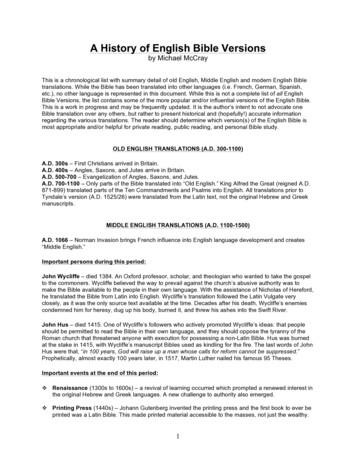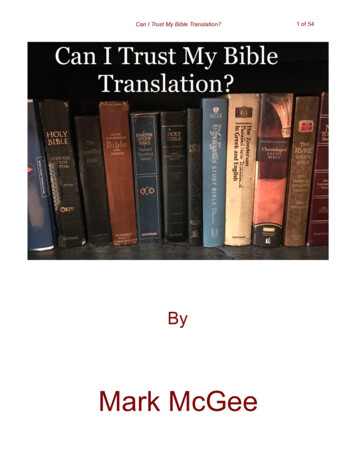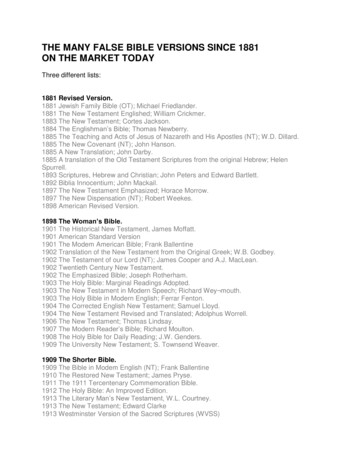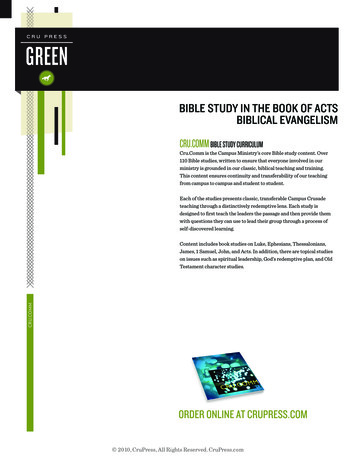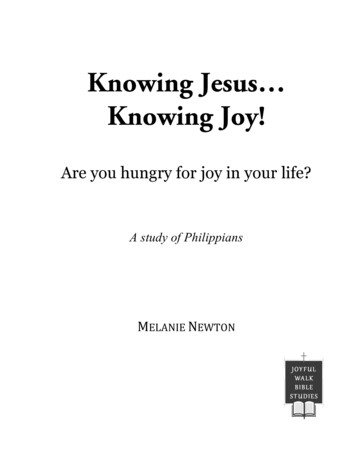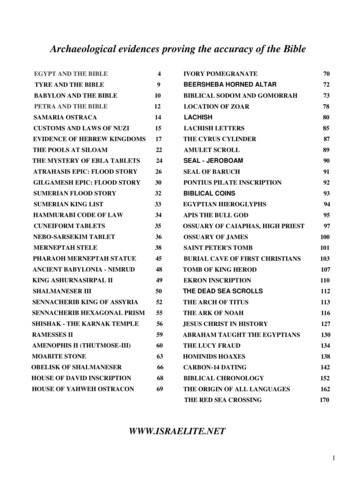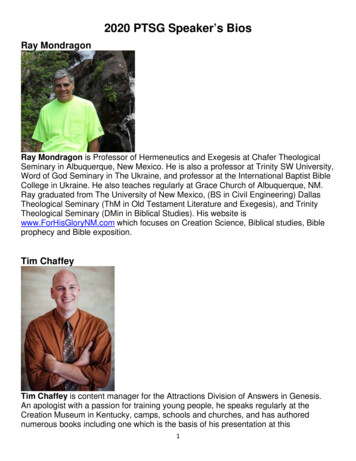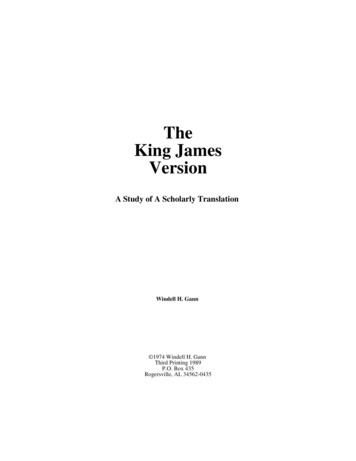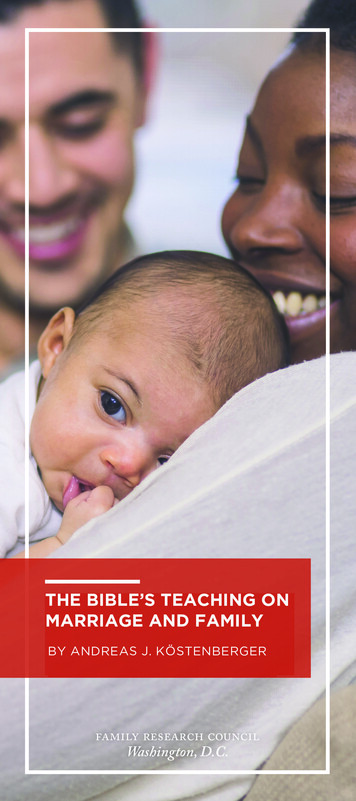
Transcription
THE BIBLE’S TEACHING ONMARRIAGE AND FAMILYBY ANDREAS J. KÖSTENBERGERfamily research councilWashington, D.C.
the bible’s teaching on marriage and familyby andreas j. köstenberger 2011 family research councilall rights reserved.printed in the united states
THE BIBLE’S TEACHING ONMARRIAGE AND FAMILYby andreas j. köstenbergerThe Current Cultural CrisisIncredible as it may seem, we can no longer assume that people in our culture understand whatthe proper definition of “marriage” and “the family” is. Not only is this a sad commentary on theimpact of same-sex marriage activists on our society, it also shows how the culture’s memory of thebiblical tradition on which it is largely based isfading fast. What is marriage, biblically defined?And what is the biblical definition of a family? Inthis brief treatise on marriage and the family, wewill take up these questions and proceed to discussa number of related matters, such as singleness, divorceand remarriage,and homosexuality, in an effort todevelop a full-orbedunderstanding of thebiblical teaching on thesubject. As I have sought todemonstrate at some lengthin my book God, Marriage, andthe Family: Rebuilding the Biblicalandreas j. köstenberger is the Director of Ph.D. Studiesand Professor of New Testament at Southeastern Baptist Theological Seminary. He is also editor of the Journal of the Evangelical Theological Society (JETS) and founding president of Biblical Foundations, an organization with the aim of “restoring thebiblical foundations of the home, the church, and society.” Dr.Köstenberger holds doctorates awarded by Trinity EvangelicalDivinity School (TEDS) and the Vienna University of Economics.His publications include the commentary on John in the BakerExegetical Commentary Series, and God, Marriage, and Family.With Peter O’Brien, he wrote Salvation to the Ends of the Earth,and The Book Study Concordance with Raymond Bouchoc.
Foundation, marriage and the family are institutions under siege today, and only a return to thebiblical foundation of these God-given institutions will reverse the decline of marriage and thefamily in our culture today.What Is the Family?The Bible defines “family” in a narrow sense asthe union of one man and one woman in matrimonywhich is normally blessed with one or several naturalor adopted children. In a broad sense, this familyalso includes any other persons related by blood(the extended family). In the book of Genesis,we read that God in the beginning created firsta man (Adam) to exercise dominion over hiscreation and subsequently a woman (Eve) asthe man’s “suitable helper” (Genesis 2:18, 20).Then, the inspired writer remarks, “Thereforea man shall leave his father and his mother andhold fast to his wife, and they shall become oneflesh” (Genesis 2:24 ESV). This verse sets forththe biblical pattern as it was instituted by God atthe beginning: one man is united to one womanin matrimony, and the two form one new natural family. In this regard, “become one flesh” notonly refers to the establishment of one new familybut also to the husband and wife’s sexual unionleading to the procreation of offspring. This, inturn, is in keeping with God’s original commandto the first human couple to “be fruitful and multiply and fill the earth and subdue it and have dominion” over all of creation (Genesis 1:28).These aspects of marriage—the complementarityof male and female, and the irreplaceable role ofmale-female relations in reproducing the humanrace—are part of the original order of creation,2
and are evident to all human beings from the enduring order of nature. These common elementsof marriage are at the heart of our civil laws defining and regulating marriage. Therefore, people ofall cultures and religions—including those wholack faith in God, Christ, or the Bible—are capable of participating in the institution of marriage. However, we who are Christians believethat the fullest understanding of God’s will formarriage can be derived from a careful examination of scriptural teachings. It is incumbent uponthe church to educate both itself and the largerculture regarding the full breadth and depth ofGod’s intentions for marriage.3
Marriage: Contract orCovenant?Today, marriage and the family are regularlyviewed as social conventions that can be enteredinto and severed by the marital partners at will.As long as a given marriage relationship meetsthe needs of both individuals involved and is considered advantageous by both sides, the marriageis worth sustaining. If one or both partners decide that they will be better off by breaking up themarriage and entering into a new, better maritalunion, nothing can legitimately keep them frompursuing their self-interest, self-realization, andself-fulfillment. To be sure, there is talk aboutthe cost of divorce and the toll exerted on thechildren caught up in the marital separation oftheir parents, but even such a toll is considered tobe worth paying in order to safeguard the mostcherished principles of our independent-minded,freedom-worshipping, individual rights-exaltingculture. If one or both marriage partners wantto get out of the marriage, nothing should holdthem back, or else the culture’s supreme values—individual choice and libertarian freedom—arenot given their due.ContractBy contrast, the Bible makes clear that, at theroot, marriage and the family are not human conventions based merely on a temporary consensusand time-honored tradition. Instead, Scriptureteaches that family was God’s idea and that marriage is a divine, not merely human, institution.The implication of this truth is significant indeed, for this means that humans are not free torenegotiate or redefine marriage and the familyin any way they choose but that they are called to4
preserve and respect what has been divinely instituted. This is in keeping with Jesus’ words, uttered when his contemporaries asked him aboutthe permissibility of divorce: “What thereforeGod has joined together let not man separate”(Matthew 19:6). For this reason, marriage is farmore than a human social contract; it is a divinelyinstituted covenant.CovenantBut what is a “covenant”? In essence, a covenantis a contract between two parties that is established before God as a witness, a contract whosepermanence is ultimately safeguarded by noneother than God himself. In this sense, marriageis a covenant: it is entered into by the husbandand the wife before God as a witness. Becauseit is ultimately God who has joined the marriagepartners together, the husband and the wife vowto each other abiding loyalty and fidelity “tilldeath do us part.” Rightly understood, therefore,a marriage entered into before God involves threepersons: a husband, a wife, and God. For this reason, it is not self-interest, human advantage, oran unfettered commitment to personal freedomthat governs the marriage relationship, but thehusband and wife’s joint commitment to conducttheir marriage based on God’s design and sovereign plan.5
What Is Marriage?Marriage is a covenant, a sacred bond betweena man and a woman instituted by and publiclyentered into before God and normally consummated by sexual intercourse. God’s plan for themarriage covenant involves at least the followingfive vital principles:PERMANENCE(1) The permanence of marriage: Marriage is intended to be permanent, since it was establishedby God (Matthew 19:6; Mark 10:9). Marriagerepresents a serious commitment that should notbe entered into lightly or unadvisedly. It involvesa solemn promise or pledge, not merely to one’smarriage partner, but before God. Divorce is notpermitted except in a very limited number of biblically prescribed circumstances (see Divorce below).SACREDNESS(2) The sacredness of marriage: Marriage is notmerely a human agreement between two consenting individuals (a “civil union”); it is a relationship before and under God (Genesis 2:22).Hence, a “same-sex marriage” is an oxymoron, acontradiction in terms. Since Scripture universally condemns homosexual relationships (see further under Homosexuality below) God will neversanction a marital bond between two members ofthe same sex.6
INTIMACY(3) The intimacy of marriage: Marriage is themost intimate of all human relationships, uniting a man and a woman in a “one-flesh” union(Genesis 2:23–25). Marriage involves “leaving”one’s family of origin and “being united” to one’sspouse, which signifies the establishment of anew family unit distinct from the two originating families. While “one flesh” suggests sexualintercourse and normally procreation, at its veryheart the concept entails the establishment of anew kinship relationship between two previouslyunrelated individuals (and families) by the mostintimate of human bonds.MUTUALITY(4) The mutuality of marriage: Marriage is a relationship of free self-giving of one human beingto another (Ephesians 5:25–30). The marriagepartners are to be first and foremost concernedabout the wellbeing of the other person and tobe committed to each other in steadfast love anddevotion. This involves the need for forgivenessand restoration of the relationship in the case ofsin. Mutuality, however, does not mean samenessin role. Scripture is clear that wives are to submitto their husbands and to serve as their “suitablehelpers,” while husbands are to bear the ultimate responsibility for the marriage before God(Ephesians 5:22–24; Colossians 3:18; see alsoGenesis 2:18, 20).7
EXCLUSIVENESS(5) The exclusiveness of marriage: Marriage is notonly permanent, sacred, intimate, and mutual; itis also exclusive (Genesis 2:22–25; 1 Corinthians7:2–5). This means that no other human relationship must interfere with the marriage commitment between husband and wife. For this reason,Jesus treated sexual immorality of a married person, including even a husband’s lustful thoughts,with utmost seriousness (Matthew 5:28; 19:9).For the same reason, premarital sex is also illegitimate, since it violates the exclusive claimsof one’s future spouse. As the Song of Solomonmakes clear, only in the secure context of an exclusive marital bond can free and complete givingof oneself in marriage take place.How Did Sin Affect Marriageand the Family?Knowing the divine ideal for marriage, and awarethat marriage and the family are divine institutions, we are now able to move from God’s creation of man and woman and his institution ofmarriage to the Fall of humanity and its negativeconsequences on the marriage relationship. As astudy of biblical history shows, humanity’s rebellion against the Creator’s purposes led to at leastthe following six negative consequences: (1) polygamy; (2) divorce; (3) adultery; (4) homosexuality; (5) sterility; and (6) gender role confusion.8
PolygamyThe first shortcoming, polygamy—more specifically, polygyny, marrying multiple wives—violates God’s instituted pattern of marital monogamy. While it was certainly within God’s prerogative and power to make more than one wifefor the man, God only made Eve. Yet within sixgenerations after the fall of humanity, barely afterAdam had died, Lamech took two wives (Genesis4:19). Later, prominent men in Israel’s historysuch as Abraham, Esau, Jacob, Gideon, Elkanah,David, Solomon, and others engaged in polygamy. However, not only did polygamous marriagefall short of God’s original design, it regularly resulted in disruptive favoritism, jealousy betweencompeting wives, and decline into idolatry.DivorceThe second compromise of God’s ideal for marriage was divorce, which disrupted the permanenceof marriage. While divorce became so commonthat it had to be regulated in the Mosaic code(Deuteronomy 24:1–4), the Bible makes clearthat God hates divorce (Malachi 2:16). Divorceis also used repeatedly as an analogy for spiritualapostasy (Isaiah 50:1; Jeremiah 3:8).AdulteryA third shortcoming was adultery, the breaking ofone’s marriage vows. The Decalogue stipulates explicitly, “You shall not commit adultery” (Exodus20:14; Deuteronomy 5:18). An egregious caseof adultery was David’s sin with Bathsheba (2Samuel 11). In cases such as these, the principleof marital fidelity to one’s marriage partner wascompromised. The Book of Proverbs calls adultery both foolish and dangerous (e.g. Proverbs2:16–19; 5:3–22; 6:32–33; 7:5–23; 9:13–18). In9
the Old Testament, adultery is frequently used asan analogy to depict the spiritual unfaithfulnessof God’s people Israel (Jeremiah 3:8–9; Ezekiel16:32, 38; Hosea 1:1–3:5).HomosexualityHomosexuality, fourth, marks another falling awayfrom God’s creation purposes in that it violatesthe divine will for marriage to be between oneman and one woman. As Genesis 2:24 stipulates,“A man [masculine] shall leave his father and hismother and hold fast to his wife [feminine], andthe two shall become one flesh.” Heterosexualityis the only possible arrangement for marriage, asthe Creator has commanded and expects marriedcouples to “be fruitful and multiply and fill theearth” (Genesis 1:28). Since homosexuality involves same-sex intercourse that cannot lead toprocreation, it is unnatural and cannot logicallyentail the possibility of marriage.SterilityA fifth shortcoming of God’s ideal for marriageis sterility, which falls short of the fertility desiredby the Creator. Fertility is implicit in the biblical reference to the “one flesh” union. At times,lack of fertility is said in the Old Testament tobe the result of personal sin (Genesis 20:17–18;2 Samuel 6:23), while on other occasions sterility is presented as a simple fact of (fallen) nature (Genesis 11:30; 25:21; 30:1; 1 Samuel 1:2).However, God is often shown to answer prayersfor fertility offered by his people in faith (e.g. 1Samuel 1:9–20).10
Gender ConfusionGender role confusion is a sixth and final result ofhumanity’s rebellion against the Creator. WhereGod’s design for man and woman to be distinctyet complementary partners in procreation andstewardship of God’s earth is diluted, people willinexorably be confused about what it means tobe masculine or feminine, and the lines betweenthe two sexes made by God will increasingly beblurred.Despite the above-mentioned ways in whichGod’s original design for marriage and the family was compromised, however, the Bible in theOld Testament continues to extol the virtues ofthe excellent wife (Proverbs 31:10–31) and tocelebrate the beauty of sex in marriage (Song ofSolomon).The Restoration of God’sOriginal Design for Marriageand the Family in ChristThe New Testament teaches that the restorationof God’s original design for marriage in Christis part of God’s realignment of all things underChrist’s authority and lordship. In the book ofEphesians, we read that it is God’s purpose “tobring all things in heaven and on earth togetherunder one head, even Christ” (Ephesians 1:10,NIV). Thus marriage is not an end in itself butpart of God’s end-time restoration of all things inthe person of Jesus Christ. Part of this restorationis that all evil powers are brought under controland are submitted to the supreme authority ofChrist (Ephesians 1:21–22). Later on in the same11
letter, Paul addresses the subject of marriage ingeneral, and marital roles in particular, withinthe larger context of believers needing to be filledwith the Holy Spirit (Ephesians 5:18).What is the biblical pattern for marriage? Thisis best seen in a close study of the pre-eminentpassage on marital roles in the New Testament,Ephesians 5:21–33. In this passage, instructionsare given to both husbands and wives in formof a “house table,” which features commandsgiven first to the person under authority followed by instructions for the person in a position of authority. In keeping with this pattern,the passage addresses first wives, then husbands(Ephesians 5:22–33); first children, then parents(Ephesians 6:1–4); and first slaves, and then mas-12
ters (Ephesians 6:5–9; similar “house tables” arealso found in Colossians 3:18–4:1 and 1 Peter2:11–3:7).Wives, for their part, are called to submit to theirown husbands, as to the Lord. As the church submits to Christ, so wives should to their husbandsin everything (Ephesians 5:21–24). Husbands, inturn, are to love their wives as Christ loved thechurch and gave himself up for her. They are toprovide for their wives both physically and spiritually and to cherish them as God’s special provision for them (Ephesians 5:25–30). As Christianhusbands and wives live out these marital roles,God’s original creation design for marriage will befulfilled once again: “Therefore a man shall leavehis father and mother and hold fast to his wife,and the two shall become one flesh” (Ephesians5:31, citing Genesis 2:24).As mentioned, this pattern of headship and submission is placed within the larger context ofChrist’s headship over all other powers, whichPaul addressed at the beginning of his letter tothe Ephesians (see Ephesians 1:10, 20–23). Paulreturns to this subject at the end of his epistlewhere he urges all Christians—including husbands and wives, parents and children—to puton the “whole armor of God” so they can standagainst the devil (Ephesians 6:10; for the various pieces in this spiritual “armor,” see Ephesians6:14–18). In this warfare, believers’ struggle is notagainst flesh and blood, but against the evil supernatural (Ephesians 6:12). Armed with truth,righteousness, the gospel, faith, salvation, andGod’s word, they will be able to stand firm andresist the devil “in the evil day” (Ephesians 6:13).The reality of the power of Satan and his forces explains at least in part why there is so much13
conflict in many marriages and families today. Italso helps account for the widespread nature ofdivorce and the massive assault on marriage as aninstitution in our contemporary culture.SinglenessWe turn now to a discussion of singleness and theunmarried state. In Old Testament times, singleness was rare among individuals old enough tomarry. Those unmarried were therefore limitedto widows, eunuchs, those who could not marrydue to diseases such as leprosy or severe economicdifficulties, those who did not marry because ofsome type of divine call, those who had undergone a divorce, or unmarried young men andwomen. Thus marriage was the overwhelmingnorm in Old Testament times, in keeping withthe foundational creation narrative in Genesis 1and 2.In the New Testament, a somewhat differentpicture emerges. Major figures such as John theBaptist, Jesus, Paul, and Timothy were unmarried. Jesus spoke favorably about “eunuchs forthe sake of the kingdom of heaven” (Matthew19:12), and Paul even called celibacy a “gift fromGod” (1 Corinthians 7:7). He further suggestedthat married people’s interests were divided whilethe unmarried could devote themselves wholly tothe Lord (1 Corinthians 7:32–35). What is more,Jesus taught that in the eternal state, there will beno more marriage, but all will be “like angels inheaven” (Matthew 22:29–30).Thus we see in the sweep of biblical history atrend from marriage as the norm (with singlenessbeing limited to exceptional cases), to a place14
where the advantages and disadvantages of bothmarriage and singleness are affirmed (in Jesus andPaul), to a marriage-less state in heaven where theonly “marriage” will be that of Jesus, the heavenlybridegroom, to the church as his spiritual “bride.”HomosexualityWhat does the Bible teach on the subject of homosexuality? As mentioned, the Genesis creationaccount stipulates heterosexual, not homosexual,marriage as God’s original design. Homosexualityfalls short in several critical ways. First, homosexual relationships fall short in the area of procreation, since they are by their very nature not ableto fulfill God’s creation mandate for humanity tobe fruitful, multiply, and fill the earth.15
Second, homosexuality also violates anothercardinal underlying principle of God’s creationdesign for human relationships, namely that ofcomplementarity. The very fact that in some homosexual relationships one partner takes on amale and the other a female role (attested by twodifferent Greek words for homosexuality in theNew Testament) provides indirect support forthe complementarity inherent in the divine creation design.In recent years, homosexual advocates have argued that the Bible, rightly interpreted, does notforbid homosexual relationships, only perverse expressions of such. For example, they have arguedthat God’s judgment on Sodom on Gomorrah(Genesis 18:17–19:29) was merely for these cities’ inhospitality, not for the sin of homosexuality. However, while Sodom and Gomorrah didin fact show a lack of hospitality, it is hardly con-16
ceivable that God would punish these cities by utter annihilation for this comparatively minor offense. Also, the Epistle of Jude clearly states thatthe people of Sodom and Gomorrah “indulged insexual immorality and pursued unnatural desire”(i.e. homosexuality; Jude 7; cf. Romans 1:26–27).With regard to the Levitical Holiness Code(Leviticus 18:22; 20:13), some have suggestedthat these passages prohibited only homosexualacts performed by Canaanite temple prostitutesas part of the worship of false gods, not homosexuality at large. However, these passages are clearlygeneral in nature, which is seen by the applicationof the word “abomination” elsewhere also to incest, adultery, and bestiality (Leviticus 18:6–23).None of these sins are prohibited only in the context of idolatrous worship; all have broader, universal application. In the New Testament, Pauladdresses the issue of homosexuality extensivelyin his letter to the Romans, where he writes, “Forthis reason God gave them up to dishonorablepassions. For their women exchanged natural relations for those that are contrary to nature; andthe men likewise gave up natural relations withwomen and were consumed with passion for oneanother, men committing shameless acts withmen and receiving in themselves the due penaltyfor their error” (Romans 1:26–27). This is followed by a long list of vices (Romans 1:29–31).Again, the Bible’s prohibition clearly refers tohomosexuality at large, not merely to pervertedforms of it (see also 1 Corinthians 6:9 and 1Timothy 1:10).17
DivorceAs mentioned, divorce is a result of the Fall ofhumanity. In the Old Testament, Deuteronomy24:1–4 regulates divorce in ancient Israel. InJesus’ day, rabbinic schools lined up behind twomajor interpretations of this passage. The conservative school of Shammai allowed for divorcein cases of immodest behavior or sexual immorality. The more moderate school of Hillel allowed divorce in any instance where a wife haddone something displeasing to her husband. Itappears that this more permissive interpretationheld sway among most of Jesus’ contemporaries(see Matthew 19:3).18
Jesus, for his part, interpreted the passage as allowing divorce only in cases of sexual immorality,that is, sexual marital unfaithfulness (Matthew19:9; cf. Matthew 5:32; Greek porneia). Even insuch cases, divorce is only permissible, not encouraged or even preferable. Instead, Jesus stronglyinsisted that marriage according to God’s originaldesign was lifelong and permanent, based on thestatement in Genesis that a man will leave his father and mother and hold fast to his wife, “andthey shall become one flesh” (Matthew 19:5, citing Genesis 2:24). Jesus’ conclusion was thereforethat, “What therefore God has joined together,let not man separate” (Matthew 19:6).Paul, likewise, extolled the virtues of marriage(see especially Ephesians 5:21–33), calling onhusbands to love their wives and on wives tosubmit to their husbands and to treat them withrespect. The only legitimate divorce allowed byPaul is what has been called the “Pauline privilege.” This refers to cases where in an unbelieving couple one of the spouses comes to faith inChrist and the other partner refuses to continuethe marriage. Addressing this kind of situation,Paul stipulates, “But if the unbelieving partnerseparates, let it be so. In such cases the brotheror sister is not enslaved. God has called you topeace” (1 Corinthians 7:15).Thus there are only two (or possibly three) biblically sanctioned instances of divorce: (1) sexualmarital unfaithfulness (i.e. adultery); and (2) theunbelieving spouse’s refusal to continue the marriage after the conversion of the other partner. Inaddition, marital separation (though not necessarily divorce) may be needed in cases of persistent physical spousal abuse.19
ConclusionThe contemporary culture is in a deep crisis regarding marriage and family today. While thecrisis has important political, social, and economic ramifications, in the ultimate analysisonly a spiritual return to the biblical foundationswill address the root issue of the current crisis.Marriage and the family were God’s idea, and asdivine institutions they are not open to humanrenegotiation or revision. As we have seen, theBible clearly teaches that God instituted marriageas a covenant between one man and one woman,a lifelong union of two partners created in God’simage to govern and manage the earth for him. Inkeeping with his wonderful design, the Creatorwill normally bless a married couple with children, and it is his good plan that a family madeup of a father, a mother, and several children wit-ness to his glory and goodness in a world that hasrejected the Creator’s plan and has fashioned avariety of God-substitutes to fill the void that canproperly be filled only by God himself.20
ADDITIONAL RESOURCESFROM FAMILY RESEARCH COUNCILStay connected with FRC bysubscribing to our free services atfrc.org/connectWASHINGTON UPDATE wusubFamily Research Council’s flagship subscription:a daily email update with the latest pro-family take onWashington’s hottest issues. Subscribe at frc.org.TAKE ACTION ALERTScatsubAlerts notify you about opportunities to activelyparticipate in Family Research Council efforts touphold pro-life, pro-family, and pro-freedom values inWashington. Subscribe at frc.org.FRCBLOG.COMFRC’s blog analyzes the most important news andissues at the forefront of the fight for religiousliberty, the protection of life at every stage, and thedefense of marriage and the family, all from a biblicalperspective. Don’t miss this daily source of in-depthanalysis of the most fundamental issues that areshaping our nation’s future.Follow Us on Social Media!
Founded in 1983, Family ResearchCouncil is a nonprofit researchand educational organizationdedicated to articulating andadvancing a family-centeredphilosophy of public life. Inaddition to providing policyresearch and analysis for thelegislative, executive, andjudicial branches of the federalgovernment, FRC seeks to informthe news media, the academiccommunity, business leaders, andthe general public about familyissues that affect the nation.Family Research Council reliessolely on the generosity ofindividuals, families, foundations,and businesses for financialsupport. The Internal RevenueService recognizes FRC as a taxexempt, 501(c)(3) charitableorganization. Donations to FRCare therefore tax-deductible inaccordance with Section 170 ofthe Internal Revenue Code.To see other FRC publicationsand to find out more about FRC’swork, visit frc.org.BC18J02tony perkins, president801 g street nwwashington, d.c. 20001order line 800-225-4008frc.org
THE BIBLE’S TEACHING ON MARRIAGE AND FAMILY by andreas j. köstenberger andreas j. köstenberger is the Director of Ph.D. Studies and Professor of New Testament at Southeastern Baptist Theo-logical Seminary. He is also editor of the Journal of the Evan-gelical Th


